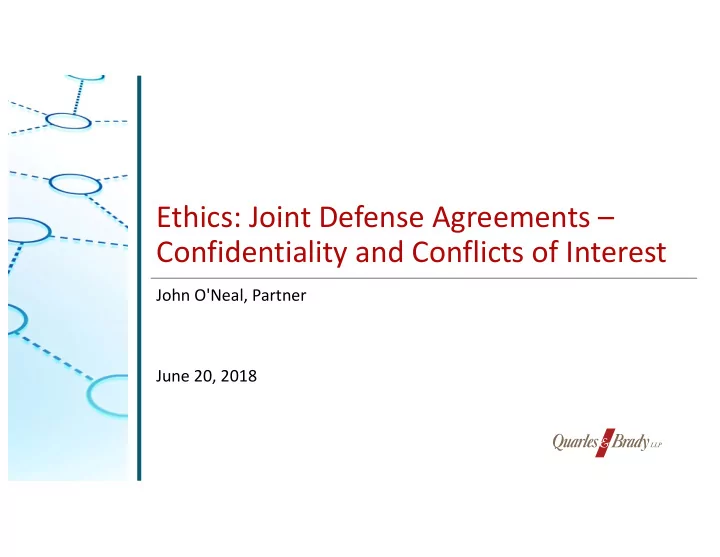

Ethics: Joint Defense Agreements – Confidentiality and Conflicts of Interest John O'Neal, Partner June 20, 2018
What is a Joint Defense Agreement? Common Interest Doctrine: If two or more clients with a common interest in a matter are represented by separate lawyers and they agree to exchange information about the matter, a communication which qualifies as privileged that relates to the matter is privileged against third parties. Arizona Independent Redistricting Com'n v. Fields , 206 Ariz. 130, 141‐42, 75 P.3d 1088, 1099‐1100 (App. 2003) 2
What is a Joint Defense Agreement? Joint Defense Agreement ("JDA") is an oral or written agreement between the parties which includes the parties' commitments to one another to assure confidentiality pursuant to the Common Interest Doctrine. 3
Why enter into a Joint Defense Agreement? • Helps parties whose interests are aligned to coordinate with each other. • Helps to minimize redundancy and costs. 4
Important Characteristics • "Defense" is a misnomer – Common Interest Doctrine may be used by plaintiffs. • Not really a privilege – Is a common law exception to rule that communications between a person and a lawyer representing another person are not privileged. • Communications solely between clients are not protected. • Must further a "legal interest". 5
Potential Conflicts Of Interest For Attorneys An attorney who receives confidential information under a JDA owes a duty of confidentiality to the parties to the JDA, not just the attorney's actual client. • Some courts refer to duty as an implied attorney‐client relationship. • Some have called it a fiduciary duty. 6
Bottom Line • Attorney owes a duty of confidentiality to parties to a JDA. • Consequences of that duty are tested under the ethics rules dealing with confidentiality and conflicts of interest. • An attorney can be disqualified as a result of a JDA. • An Attorney's disqualification as a result of a JDA can be imputed to a firm. Roosevelt Irrigation District v. Salt River Project Agricultural Improvement and Power District , 810 F. Supp.2d 929 (D. Ariz. 2011) 7
Disqualification In Same Matter U.S. v. Henke , 222 F.3d 633 (9 th Cir. 2000) 8
Disqualification Under Ethical Rule 1.9 – "Former Client" A potentially disqualifying conflict stemming from a duty of confidentiality created by a JDA exists where: • There was an exchange of confidential information. • The former representation is the same or is substantially related to the current litigation. • The current client's interests are materially adverse to the interests of the party claiming to be protected by the JDA. Roosevelt Irrigation District v. Salt River Project Agricultural Improvement and Power Dist rict, 810 F. Supp.2d 929 (D. Ariz. 2011) 9
In‐House Counsel Can Be Disqualified • Ethical Rules regarding disqualification apply to in‐house counsel. • Legal departments are firms under ER 1.10. • An in‐house counsel's conflict can be imputed and lead to disqualification of entire legal department. Dynamic 3D Geosolutions, LLC v. Schlumberger Limited , 837 F.3d 1280 (Fed. Cir. 2016) 10
What To Do? • Use comprehensive JDAs, with precise terms and waivers. • Ask about/keep track of participation in JDAs. • Use effective screens under ER 1.10 when appropriate. • Know law of jurisdiction; the rules vary. 11
Questions?
THANK YOU John O'Neal Partner (602) 229‐5436 john.oneal@quarles.com
Recommend
More recommend